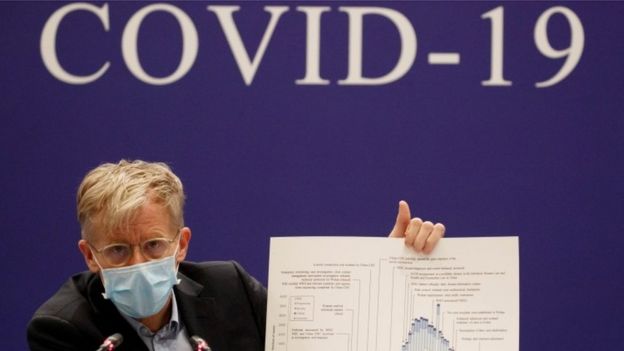 YOUTUBE
YOUTUBE
As the coronavirus - or to be precise Covid-19 - spreads around the world, getting accurate information about the disease becomes ever more important.
And in the social media age, that puts a heavy responsibility on the likes of Facebook and YouTube.
These are the platforms that billions now rely on for news and they are already providing fertile territory for those wanting to spread misinformation. On Facebook, it is in groups opposing vaccines and those campaigning against 5G mobile phone networks that scare stories appear most likely to take hold.
I've scanned a number of the 5G groups, and found plenty of comments suggesting there is a link between the virus and the new networks. The Stop 5G UK group has more than 27,000 members, one of whom has posted this: "I've heard it's not a serious "Virus", it's about as bad as a flu or cold. So really this is a perfect plan to cover up EMF/5G related illnesses."
Scroll down, and others have shared links to websites and videos connecting the coronavirus to the rollout of 5G in the part of China where it originated. "5G launches in Wuhan weeks before Coronavirus outbreak" reads the headline on an article in a publication called the News Commenter.
A YouTube video with the title "WUHAN CORONA VIRUS IS A 5G L.E.D SMART STREET LIGHT TEST BED" is also popular in this group and others. Other YouTube videos share complex conspiracy theories including a suggestion that the Diamond Princess cruise ship whose passengers had to be quarantined was affected by the virus because it used 5G technology for its connectivity.
 GETTY IMAGES
GETTY IMAGES
Another popular theory is that the virus was engineered in a lab and deliberately released by, take your pick, the Chinese or American government. Over on the Facebook 5G and microwave radiation group, an article from Technocracy News claims: "It is becoming pretty clear that the Hunan coronovirus is an engineered bio-weapon that was either purposely or accidentally released."
 GETTY IMAGES
GETTY IMAGES
To be fair to Facebook, it appears to have upped its game when it comes to combating misinformation. Search for "coronavirus" on its platform and the top results will be reliable information from sites such as the World Health Organization (WHO). If you find an anti-vaccination group you want to join, a pop-up message appears saying: "Learn why the World Health Organization recommends vaccinations to prevent many diseases."
YouTube too appears to be trying to calm fears, with a WHO banner ad appearing above any videos about the virus. But on at least one conspiracy theory video, adverts are still appearing, meaning that the site's owner Google is still profiting from misinformation.
Facebook says that as well as promoting accurate information, it has taken steps to combat the spread of misinformation about the virus. Its third-party fact-checkers investigate dubious claims and when they rate information as false, the company limits its spread across Facebook and Instagram.
 REUTERS
REUTERS
Adverts that could misinform people or suggest that something is in limited supply are banned - for instance Facebook would not allow an ad with a claim that face masks are 100% guaranteed to prevent the spread of the virus.
A YouTube spokesperson said the company was committed to providing "timely and helpful information" and reducing the spread of harmful misinformation. But while YouTube bans videos promoting medically unsubstantiated ways to prevent the virus, it seems it does not remove or flag material that promotes conspiracy theories about it.
I contacted a company whose adverts appeared before one of the videos, London-based MVH Marketing. A spokeswoman said the firm spends its advertising money with YouTube rather than the video creators, and usually the platform ensured that ads were not placed next to unsuitable content.

She said the firm had now ensured its ads would not be seen again on this particular video: "Obviously we wouldn't want to be associated with something that did not fit with our brand."
The social media platforms appear to be getting better at stopping misinformation from going viral, at least in public posts. But inside private groups, many with thousands of members, fake news is a commodity that still seems in great demand.


